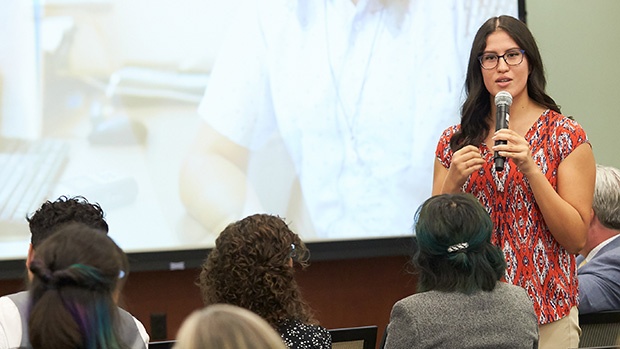
Latinx Voices of Southern Nevada is an oral history project collecting the stories of our regions diverse Latinx citizens. This series highlights the UNLV students who are working as oral historians on this UNLV Oral History Research Center project.
For UNLV junior Nathalie Martinez, being involved with the Latinx Voices of Southern Nevada project in the UNLV University Libraries Special Collections and Archives is a chance to not only connect with her own heritage, but to shine a light on the impact the Latinx community has had on the growth of Las Vegas.
"Latinx Voices gives the Latinx community the recognition it deserves," she says. "The oral histories collected tell the stories of not only the most recognized Latinx community members but also those who have been silenced because of their immigration status. It is my humble belief that their stories are not only representative of Las Vegas but also the United States - a nation founded and inhabited by immigrants. It is an honor to hear these stories and be given the chance to share them with the rest of the community."
Raised in Santa Monica, California and Henderson, Nathalie grew up as an only child to parents of Colombian and Salvadorian heritage. She attended Jack Dailey Elementary School, Roy W. Martin Middle School, and Valley High School where she pursued the International Baccalaureate Program. She is double-majoring in French and International Business with a minor in Spanish.
We asked Nathalie to share more about her experiences, what she has learned so far, and who her dream interview would be for the Latinx Voices of Southern Nevada.
Why did you want to be involved in the Latinx Voices Project?
The Latinx narrative has been silenced for generations across the United States of America. Living in Las Vegas, where more than 30 percent of the population is Latinx, the importance of collecting the stories of those who helped build this great city is unprecedented. Knowing how important those stories are a record of the story of Las Vegas, I wanted to help collect the stories that reflect the diversity of Southern Nevada. I wanted to help recognize these voices that not only share stories of the narrative of Southern Nevada but of the United States.
How do you imagine future researchers, educators and curious people will use the Latinx Voices project?
The Latinx Voices Project stands as a testament of the Latinx community of Las Vegas. I believe that these oral histories will be used in the future not only by researchers but also by the families of the people we interview. They will be so proud of their past and have the ability to access and share the stories of their own family heritage. These families will be able to be even more connected with their pasts and their family roots.
Describe what you see as the benefits to the Las Vegas community that this project provides.
Ever since I started this project, I have truly been taken aback by the amount of support we have received from the community. The Latinx Voices project has given the chance for the community to not only highlight the Latinx students of UNLV taking part in this research, but also to discover the significance of the Latinx community within the Southern Nevada narrative. This project gives a chance to the Latinx community to unite and help tell the story of the place they call “home”.
What is something you didn’t realize before working on this project?
Before beginning the Latinx Voices project, I hadn’t realized how much the community would support this project. From NV Energy to the Latin Chamber of Commerce and MGM Resorts International, it has been absolutely wonderful to see how much the Las Vegas community wants to take part in recording the Latinx Voices of Southern Nevada.
How has working on the Latinx project changed you thus far?
As I listen to the stories of the people I interview and read the archived oral histories of the Latinx community, I reflect on my own Latinx heritage. This project has allowed me to reconnect with my own roots and be even more grateful of the sacrifices my family has made to help me become the successful woman I am today.
If you could conduct your Dream Interview, who would it be with and why?
My dream interview would be with my grandfather from Colombia. I would love to have known about his childhood and learned from his experiences. I know that I could have seen an alternate version of Colombia through his stories and gained new insight on who he truly was.


